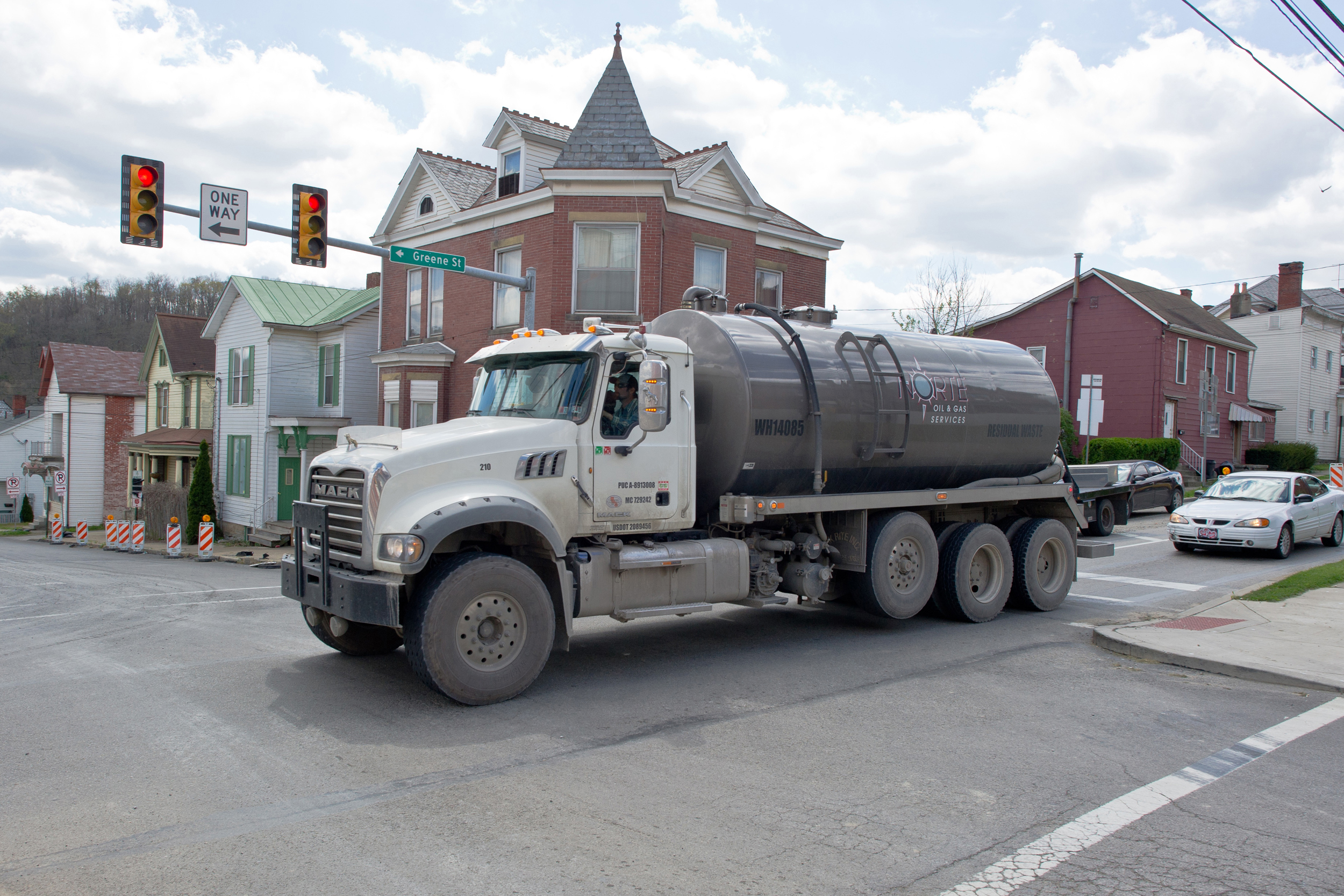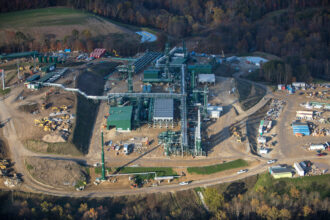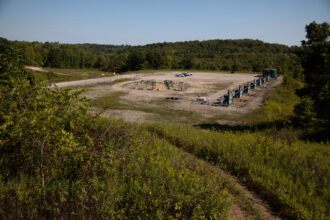In rural Western Pennsylvania, communities routinely spray briny fluids on unpaved backroads to control dust in the warmer months and ice in the winter. Often, those liquids are drilling byproducts from nearby conventional oil and gas wells.
That mostly comes courtesy of a loophole in state law that opponents say poses a risk to human and environmental health, and that they fear may soon become larger.
A potentially landmark legal case on the practice is currently before the state Environmental Hearing Board, a quasi-judicial body that hears appeals to state Department of Environmental Protection (DEP) regulations. The matter follows a previous case before the board that prompted the DEP in 2018 to impose a moratorium on formal approvals for such “roadspreading” using wastes from oil and gas wells.
But that left open the door for companies to try a second route, by instead claiming the liquids are a “coproduct.” Under that process, they test their fluids, which can contain toxic metals and radioactive materials, to ostensibly ensure they are comparable to existing commercial products. When the DEP called the coproduct testing of a northwest Pennsylvania company “invalid” this year, the firm appealed to the board.
The fight could have sweeping ramifications, said David Hess, a former DEP secretary who authors a newsletter tracking environmental issues in Pennsylvania.
“It has the potential to really open up a whole can of worms,” Hess said.
Siri Lawson, a resident of rural Warren County in northwest Pennsylvania, is also concerned. Lawson has crusaded against roadspreading—and the gas industry more widely—for decades, linking industry pollutants to respiratory health problems she suffers. Lawson was at the center of the 2018 case in which the DEP concluded it should use a stricter permitting system and subsequently suspended approvals statewide.
For several weeks, Lawson held her breath as DEP engaged in board-mandated settlement talks with appellant BCD Properties, fearing the prospect that state policy could swing back the other direction.
“If DEP meets them in the middle, it’ll be more like winner-take-all,” Lawson said. “You know, give them an inch and they’ll take a mile.”
The attorney listed for BCD Properties did not return requests for comment from Inside Climate News. A DEP spokesperson said the agency “does not comment on active litigation.” But on Thursday, the department filed a motion to dismiss BCD’s appeal, potentially signaling that the settlement talks failed.
For its part, the Pennsylvania Independent Oil & Gas Association (PIOGA), a trade group for conventional well operators, said that “spreading brine” on rural roadways has been a practice for decades, not only valued by industry but also communities for which dust from unpaved roads is a primary air pollutant. In an email, the group suggested DEP has long conducted analysis of the practice and found it safe, only to change course in recent years.
“Some individuals seem to make the incorrect assumption that people with the responsibility for spreading brine do so haphazardly and without training, which is not the case,” Dan Weaver, PIOGA president and executive director, said via email. “The municipal leaders and employees who do so follow best management practices that have been in place for years in those communities. These individuals live, work and raise their families in those communities and are stewards of the local environment. To claim otherwise is simply untrue.”
Most concerns raised about roadspreading are about the content of the wastewater itself. A 2022 Pennsylvania State University study, conducted for the DEP in a laboratory, found that brine produces runoff with problematic levels of chlorides, sodium and cancer-causing radium—and doesn’t control dust any better than rainwater. The sodium could actually damage the roads getting brine treatments, the researchers found, although PIOGA contends the study was “flawed” and did not mimic real-world conditions.
A Spreading Concern
The BCD appeal is just the latest development in a decades-long effort by the state to regulate the use of drilling wastes for roadspreading, said John Quigley, who served as DEP secretary under Democratic Gov. Tom Wolf from 2015 to 2016. He notes that the agency issued regulations in 2016 banning roadspreading from fracking, also known as unconventional oil and gas. But a simultaneous push to also ban it from conventional operations failed amid political pressure, Quigley said.
“The conventional industry operates on very thin margins, and habitually claims that pretty much any regulation—like requiring them to properly dispose of their wastewater and not dump it on roads—will kill the industry,” Quigley told Inside Climate News in an email. “Their supporters in the [Pennsylvania state legislature] take that as gospel, and fight tooth and nail against any meaningful regulation of the industry, despite ample evidence of the harms caused to public health and the environment.”
DEP has been left in unsettled territory, Quigley said, in which it “discourages” roadspreading using fluids from conventional drilling wells, but “lacks the resources to adequately enforce against the practice.” That’s also complicated by the “coproduct” loophole, which, critically, leaves it to companies themselves to perform chemical analysis and only requires the results be made available to DEP if the agency requests them.
Enter BCD Properties’ action against the state. In its legal filings, the company says DEP has failed to establish any legal standard under which a company can obtain a permit to use conventional drilling byproducts for roadspreading, and claims the agency explicitly told BCD it would not receive one.
Instead, the company says it went the coproduct route, hiring an environmental consultant in 2019 to compare the fluids from wells it draws from in Erie County to the fluids produced by Seneca Mineral Co., a roadspreading firm whose 2007 permit BCD claims gives its competitor a monopoly. After BCD’s analyst determined the products were similar, the company says it continued to sell its roadspreading products.
That is, until 2023, when a third party hired by a northwest Pennsylvania township to use BCD’s products for roadspreading was threatened with nonpayment by the township over concerns the material was not approved for use, the company said in its legal filings.
After that, DEP and a special agent from the Pennsylvania Attorney General’s Environmental Crimes Section contacted BCD, the company alleges. It says it then provided the state with a copy of its coproduct analysis, but DEP in April issued an “invalidation” letter contending that the study was flawed.
BCD filed its appeal with the state Environmental Hearing Board the following month. It said it had to cancel contracts for the summer season.
What Happens Next
Exactly where things stand now is uncertain: The merits of BCD’s case have yet to be adjudicated.
DEP’s April letter to BCD says the company’s analysis was “insufficient to support a coproduct determination,” but the agency doesn’t explicitly state why. BCD’s 2019 analysis appears to have considered just five constituents of its fluids: chloride, calcium, sodium, magnesium and a measurement of total dissolved solids. Not apparent was an analysis of any other potentially concerning constituents, such as radium.
But that’s also true of 2010 testing results from Seneca’s wells, included in BCD’s appeal, which include a wider analysis of salts but no tests for metals or other radioactive materials.
This story is funded by readers like you.
Our nonprofit newsroom provides award-winning climate coverage free of charge and advertising. We rely on donations from readers like you to keep going. Please donate now to support our work.
Donate NowHess said his read is that BCD’s analysis was judged insufficient because it looked at only five of 39 parameters the state requires in its oil and gas wastewater general permits, and did not evaluate the “threat of harm to the environment and public health.”
“It’s blatantly obvious they did not do what the regulations require at all,” Hess said.
PIOGA said it cannot comment on the merits of BCD’s case and noted that the company is not a member. But the trade group disputes the recent research on the safety of roadspreading conducted by the DEP and scientific partners and argues it contradicts prior studies the agency conducted in the field in the 1990s and 2010s.
In DEP’s latest filing in the case, it argues that its April letter to BCD simply told the company its coproduct testing was “insufficient” and was not issuing a final determination, a prerequisite for appeal. DEP also argued that the company’s other complaints, including that Seneca Minerals holds a monopoly over competitors, were not germane to the coproduct question.
Still, Hess said he’s watching the case closely because it has the potential to widen the circumstances in which roadspreading from conventional oil and gas operations can be approved.
The case may also have important implications for enforcement. As it stands, Hess said DEP data indicates the agency doesn’t know where about 85 percent of wastewater from conventional oil and gas wells produced in Pennsylvania is disposed of. Low staffing levels limit DEP’s enforcement ability, and a decision in BCD’s favor could further restrict the agency’s ability to rein in the practice.
There’s a lot of waste that DEP doesn’t have information about, Hess noted: “If you do the math, that’s about 145 million gallons of wastewater on an annual basis.”
Democratic State Rep. Greg Vitali, chair of the House Environmental & Natural Resource Protection Committee, is now perennially introducing legislation to outright ban roadspreading from conventional wells. That would settle the legal question, Hess and Quigley say, and the legislation has the explicit support of Democratic Gov. Josh Shapiro’s administration.
But all observers, including Vitali, say the legislation is highly unlikely to pass through the commonwealth’s divided government, or even a razor-thin Democratic majority in the House.
“That fact, that even some of our [Democratic] House members are serving in Republican or very close districts, makes it difficult to even get a floor vote in the House on an issue like this,” Vitali said.
Elsewhere, Hess is tracking the formation of a new “produced water” subcommittee consisting of members from several obscure state government entities and an effort by a northwest Pennsylvania company to convince DEP to issue a permit for roadspreading after processing the fluids through treatment technology.
To Lawson, the Warren County resident, it’s more of the same.
“These guys go from one to the other, to the other, to the other until they find their loophole,” she said.
About This Story
Perhaps you noticed: This story, like all the news we publish, is free to read. That’s because Inside Climate News is a 501c3 nonprofit organization. We do not charge a subscription fee, lock our news behind a paywall, or clutter our website with ads. We make our news on climate and the environment freely available to you and anyone who wants it.
That’s not all. We also share our news for free with scores of other media organizations around the country. Many of them can’t afford to do environmental journalism of their own. We’ve built bureaus from coast to coast to report local stories, collaborate with local newsrooms and co-publish articles so that this vital work is shared as widely as possible.
Two of us launched ICN in 2007. Six years later we earned a Pulitzer Prize for National Reporting, and now we run the oldest and largest dedicated climate newsroom in the nation. We tell the story in all its complexity. We hold polluters accountable. We expose environmental injustice. We debunk misinformation. We scrutinize solutions and inspire action.
Donations from readers like you fund every aspect of what we do. If you don’t already, will you support our ongoing work, our reporting on the biggest crisis facing our planet, and help us reach even more readers in more places?
Please take a moment to make a tax-deductible donation. Every one of them makes a difference.
Thank you,











